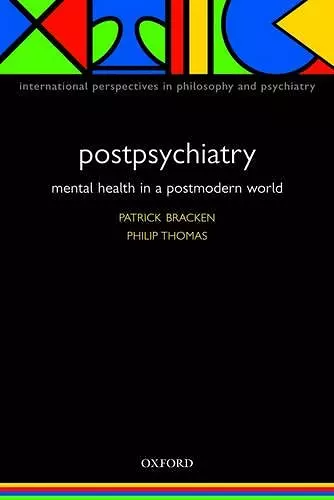Postpsychiatry
Mental health in a postmodern world
Philip Thomas author Patrick Bracken author
Format:Paperback
Publisher:Oxford University Press
Published:22nd Dec '05
Currently unavailable, and unfortunately no date known when it will be back

How are we to make sense of madness and psychosis? For most of us the words conjure up images from television and newspapers of seemingly random, meaningless violence. It is something to be feared, something to be left to the experts. But is madness best thought of as a medical condition? Psychiatrists and the drug industry maintain that psychoses are brain disorders amenable to treatment with drugs, but is this actually so? There is no convincing evidence that the brain is disordered in psychosis, yet governments across the world are investing huge sums of money on mental health services that take for granted the idea that psychosis is an illness to be treated with medication. Although some people who use mental health services find medication helpful, many do not, and resist the idea that their experiences are symptoms of illnesses like schizophrenia. Consequently they are forced into having treatment against their wishes. So, how do we make sense of this situation? Postpsychiatry addresses these questions. It involves an attempt to rethink some of the fundamental assumptions of mental health work, showing how recent developments in philosophy and ethics can help us to clarify some of the dilemmas and conflicts around different understandings of madness. Throughout, the authors examine the conflicting ways in which politicians, academics, and mental health professionals appear to understand madness, and contrast this with voices and experiences that are usually excluded - those of the people who use mental health services. They then examine the power of psychiatry to shape how we understand ourselves and our emotions, before considering some of the basic limitations of psychiatry as science to make madness meaningful. In the final section of the book they draw on evidence from service users and survivors, the humanities and anthropology, to point out a new direction for mental health practice. This new direction emphasises the importance of cultural contexts in understanding madness, placing ethics before technology in responding to madness, and minimising 'therapeutic' coercion.
... this book is very successful at making you think about your clinical practice... It challenged my thinking and I found myself nodding my head to some of the ideas presented, but totally disagreeing with others. If the aim of this book is to challenge status quo thinking then it does this very well and for this alone is highly recommended. * Journal of Mental Health *
... this book provides an engaged and, at times, provocative critique of the current state of psychiatry. As such, it deserves a wide readership. * British Journal of Psychiatry *
... an important book, and should be read by everyone with half a care to improve their understanding and practice. * Mental Health Today *
ISBN: 9780198526094
Dimensions: 233mm x 156mm x 19mm
Weight: 494g
312 pages